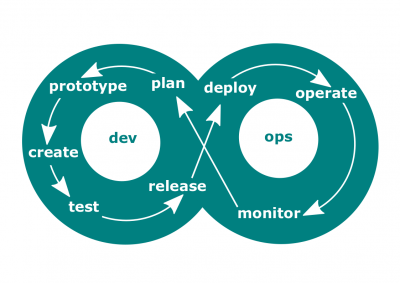DevOps
DevOps is an engineering practice and a set of concepts based on that practice that aim at unifying new product development (the Dev part) and operations (the Ops part). The primary feature of DevOps is to strongly advocate automation and monitoring at all steps of the project such as integration, testing, releasing to deployment, and infrastructure management.
DevOps aims at shorter development cycles, increased deployment frequency, more dependable releases, in close alignment with business objectives. DevOps processes refer to a sequence of phases of DevOps; DevOps toolchains refer to a set of tools used in that process.
Functions of DevOps can be compared with those of project management office (PMO) in a traditional project management framework. DevOps can be considered as an application of continuous delivery.
Definitions
According to Educaship Alliance LLC,
- DevOps. A term for a group of concepts that, while not all new, have catalyzed into a movement and are rapidly spreading throughout the technical community. Is a new term emerging from the collision of two major related trends.
According to the ITIL Foundation 4e by Axelos,
- DevOps. An organizational culture that aims to improve the flow of value to customers. DevOps focuses on culture, automation, Lean, measurement, and sharing (CALMS).
According to the ITIL Foundation 4e by Axelos,
- Effectiveness. A measure of whether the objectives of a practice, service or activity have been achieved.
According to the ITIL Foundation 4e by Axelos,
- Efficiency. A measure of whether the right amount of resources have been used by a practice, service, or activity.
According to the ITIL Foundation 4e by Axelos,
- Environment. A subset of the IT infrastructure that is used for a particular purpose, for example a live environment or test environment. Can also mean the external conditions that influence or affect something.
According to the ITIL Foundation 4e by Axelos,
- Event. Any change of state that has significance for the management of a service or other configuration item.
According to the ITIL Foundation 4e by Axelos,
- Failure. A loss of ability to operate to specification, or to deliver the required output or outcome.
According to the ITIL Foundation 4e by Axelos,
- Governance. The means by which an organization is directed and controlled.
According to the ITIL Foundation 4e by Axelos,
- Incident. An unplanned interruption to a service or reduction in the quality of a service.
According to the ITIL Foundation 4e by Axelos,
- Integrity. A security objective that ensures information is only modified by authorized personnel and activities.
According to the ITIL Foundation 4e by Axelos,
- Internet of Things. The interconnection of devices via the internet that were not traditionally thought of as IT assets, but now include embedded computing capability and network connectivity.
According to the ITIL Foundation 4e by Axelos,
- Kanban. A method for visualizing work, identifying potential blockages and resource conflicts, and managing work in progress.
According to the ITIL Foundation 4e by Axelos,
- Lean. An approach that focuses on improving workflows by maximizing value through the elimination of waste.
Inspiring quotes
- Simply put, things always had to be in a production-ready state: if you wrote it, you darn well had to be there to get it running!. --Mike Miller
- The most powerful tool we have as developers is automation. --Scott Hansellman
- The key in such a transition to continuous delivery is to expect things to get worse before you’ll be able to make them better. --Mattias Marschall
- Currently, DevOps is more like a philosophical movement, not yet a precise collection of practices, descriptive or prescriptive. --Gene Kim
